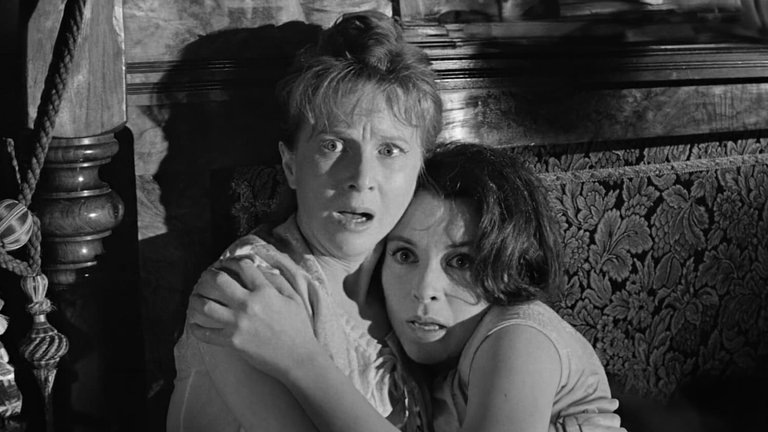
Robert Wise, a distinguished figure in Hollywood during the third quarter of the 20th century, is celebrated not only for the high quality and critical acclaim of his films but also for his remarkable versatility across various genres. Among the diverse array of films he directed, his 1963 horror classic The Haunting stands out as a seminal work that has left an indelible mark on the genre. This film is widely regarded as one of the finest examples of psychological horror, showcasing Wise's ability to blend artistic vision with compelling storytelling.
The Haunting is adapted from Shirley Jackson's acclaimed 1959 novel The Haunting of Hill House, which is often hailed as one of the most significant works in American literature. The film opens with the narration of Dr. John Markway, portrayed by Richard Johnson, a paranormal investigator captivated by the eerie history of Hill House. This massive country estate in Massachusetts has been the site of numerous tragic and suspicious deaths over the years, leading locals to believe it is haunted. Markway seeks to study paranormal phenomena and attempts to recruit individuals with psychic abilities to assist him in his research. Ultimately, only two women join him: Theo (played by Claire Bloom), a psychic, and Eleanor "Nell" Lance (Julie Harris), a spinster who devoted her youth to caring for her ill mother and now finds herself destitute after her death. Nell is chosen due to her childhood experiences with poltergeists. Accompanying them is Luke Sanderson (played by Russ Tamblyn), a distant relative of Mrs. Sanderson (played by Fay Compton), who inherited Hill House. As they spend the night in this foreboding environment, an unsettling atmosphere envelops them, exacerbated by unexplained noises and cold spots. The mounting fear profoundly affects Nell, leading her to gradually lose touch with reality.
The Haunting exemplifies "old school" horror from its very inception; Wise's decision to shoot the film in black-and-white immediately sets a tone of classic suspense. However, he also endeavours to make it feel contemporary by employing innovative camera angles, infrared filters, and an atonal score composed by Humphrey Searle. This combination creates a bizarre yet unsettling experience that effectively establishes an atmosphere of dread and mystery right from the prologue, which reveals Hill House's dark history.
The film's "old school" quality further manifests in its ability to evoke anxiety and fear through characters confronting the unknown rather than through overtly grotesque monsters or shocking imagery. Screenwriter Nelson Gidding makes a significant departure from Jackson’s novel by presenting events primarily through Nell’s perspective, allowing her internal monologues to convey her deteriorating mental state. Despite being framed as a ghost story, The Haunting never explicitly depicts any supernatural entities; instead, it leaves viewers questioning whether these apparitions exist or are merely figments of Nell’s troubled psyche.
This conceptual approach would not have succeeded without a strong cast. Julie Harris delivers an outstanding performance as Nell; her background in theatre lends authenticity to her portrayal of a character grappling with deep emotional turmoil. Harris’s relatively plain appearance allows audiences to empathise with her plight as an ordinary woman thrust into extraordinary circumstances. Notably, she draws upon her own feelings of depression during filming to enhance her performance, resulting in a portrayal that resonates deeply with viewers. In contrast, her co-stars—Richard Johnson, Russ Tamblyn, and Claire Bloom—present more polished Hollywood personas that starkly contrast with Harris’s raw authenticity.
In recent decades, The Haunting has garnered attention for its depiction of Theodora “Theo,” who has been interpreted by some critics as a representation of lesbianism. During the early 1960s, depictions of homosexuality were beginning to emerge from under strict censorship norms; however, Wise opted for subtlety in his portrayal of Theo's character. While Jackson’s novel more explicitly explores Theo’s sexuality, Wise chose to leave hints for discerning viewers who might pick up on these nuances without jeopardising the film's commercial viability.
Despite its classic status today, The Haunting presents itself as remarkably modern and intellectually engaging compared to many contemporary horror films. However, it does grapple with pacing issues; the film's slow build-up can be perceived as tedious at times—particularly during scenes that delve into Nell’s declining mental health. Critics have noted that audiences in the 1960s found The Haunting "too slow," and this sentiment likely persists among modern horror enthusiasts who may prefer more immediate thrills.
These pacing concerns contributed to its lacklustre initial box office performance; critics were not particularly enthusiastic upon its release either. However, over time, The Haunting has gained recognition as a cornerstone of horror cinema—its reputation bolstered when renowned filmmaker Steven Spielberg cited it as an inspiration for his own celebrated works.
In 1999, Jackson’s novel was adapted again into a remake directed by Jan De Bont; this version leaned heavily into explicit supernatural elements but was largely deemed unsuccessful—typical of many remakes that fail to capture the essence of their predecessors. More recently, Netflix adapted Jackson’s novel into a mini-series titled The Haunting of Hill House, released in 2018; this series was followed by an unrelated sequel titled The Haunting of Bly Manor in 2020.
RATING: 7/10 (+++)
Blog in Croatian https://draxblog.com
Blog in English https://draxreview.wordpress.com/
InLeo blog https://inleo.io/@drax.leo
Hiveonboard: https://hiveonboard.com?ref=drax
InLeo: https://inleo.io/signup?referral=drax.leo
Rising Star game: https://www.risingstargame.com?referrer=drax
1Inch: https://1inch.exchange/#/r/0x83823d8CCB74F828148258BB4457642124b1328e
BTC donations: 1EWxiMiP6iiG9rger3NuUSd6HByaxQWafG
ETH donations: 0xB305F144323b99e6f8b1d66f5D7DE78B498C32A7
BCH donations: qpvxw0jax79lhmvlgcldkzpqanf03r9cjv8y6gtmk9